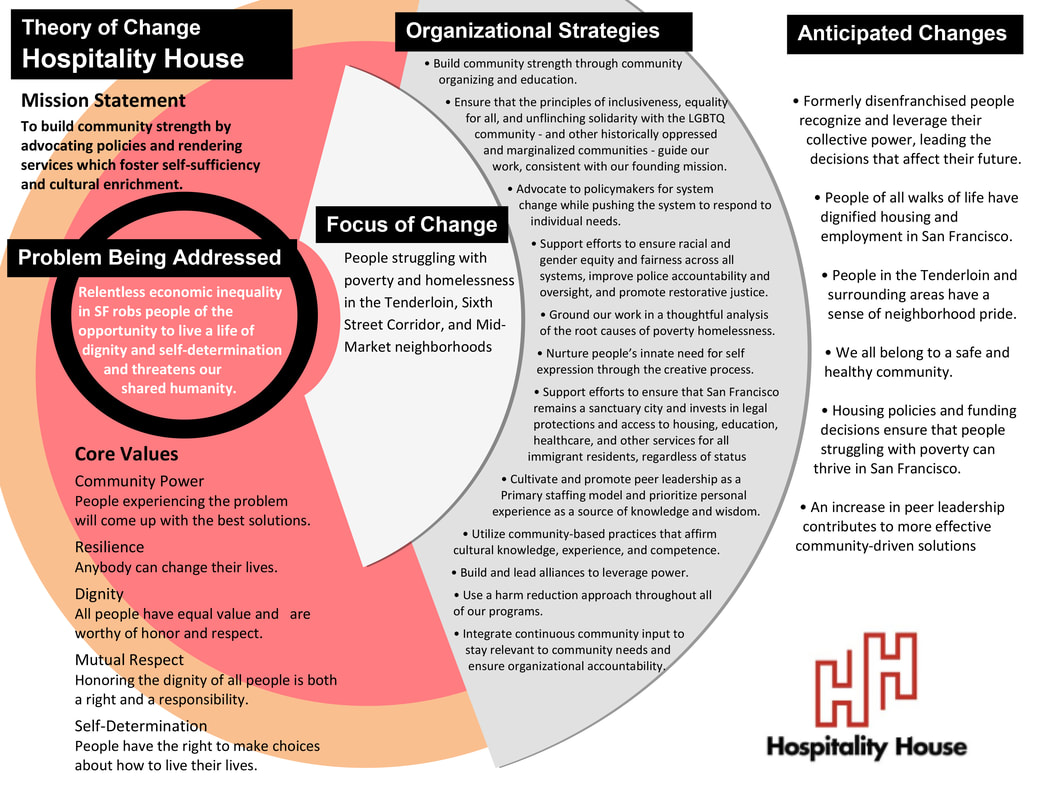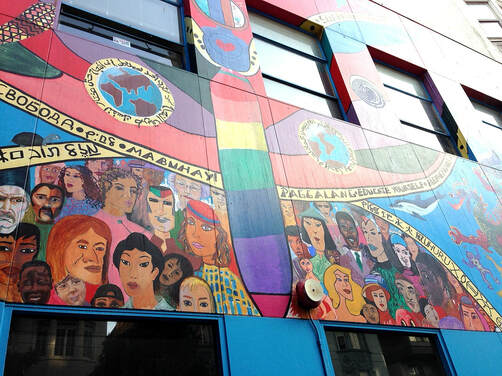A Bold Response to Communities in Crisis:
Hospitality House's Theory of Change
In February 2015, Hospitality House began the process of developing Hospitality House’s Theory of Change (TOC), a one-page strategic framework to guide our organization’s work and decision-making for the foreseeable future [scroll down to see our complete one-page Theory of Change document]. The project was made possible through the guidance of CompassPoint Nonprofit Services and the sponsorship of the Mayor’s Office of Housing and Community Development (MOHCD).
This powerful and exciting document was developed through a six-month process involving a variety of stakeholders, including our participants, community members, staff, and the board of directors. During the first meeting, a workgroup of staff, leadership, and board members were asked to create the Problem Statement. What is the current crisis being faced? The statement should excite and provoke.
After much brainstorming and discussion, a common theme surfaced. Powerful sentiments like “The system encourages or condones inequality,” “We live in systems that perpetuate inequality,” “People struggling with poverty are not valued as human beings,” and “There’s a war against the poor!” all spoke to the widening economic inequality in San Francisco. Finally, after over a month of wordsmithing and input from our staff and participants, we had our problem statement:
“Relentless economic inequality in San Francisco robs people of the opportunity to live a life of dignity and self-determination and threatens our shared humanity.”
This powerful and exciting document was developed through a six-month process involving a variety of stakeholders, including our participants, community members, staff, and the board of directors. During the first meeting, a workgroup of staff, leadership, and board members were asked to create the Problem Statement. What is the current crisis being faced? The statement should excite and provoke.
After much brainstorming and discussion, a common theme surfaced. Powerful sentiments like “The system encourages or condones inequality,” “We live in systems that perpetuate inequality,” “People struggling with poverty are not valued as human beings,” and “There’s a war against the poor!” all spoke to the widening economic inequality in San Francisco. Finally, after over a month of wordsmithing and input from our staff and participants, we had our problem statement:
“Relentless economic inequality in San Francisco robs people of the opportunity to live a life of dignity and self-determination and threatens our shared humanity.”
During the months that followed, the workgroup conducted several feedback sessions with staff, participants, shelter residents, and board members to develop the Anticipated Changes by asking the question, “If this is the problem, how will we know when it’s resolved?”
The Anticipated Changes need to be specific observable changes that indicate the problem is being solved. The statements should represent an envisioned future that are both larger than what Hospitality House can achieve as an individual organization AND something that Hospitality House will actively contribute to in selecting and designing the agency’s programs.
In the face of the City’s challenges, Hospitality House’s Anticipated Changes include preserving our Tenderloin, Sixth Street, and Mid-Market neighborhoods as places where people struggling with poverty are welcome and can thrive; assuring that our low-income residents have housing and meaningful employment; and building community power such that low-income residents actively participate in making decisions that affect their futures.
How would Hospitality House accomplish this? What are the Organizational Strategies? Grounded in our Core Values and using the same process to obtain feedback, the strategies were crafted to include: building increased capacity for advocacy, organizing, and neighborhood activation; cultivating peer leadership; holding decision-makers accountable; leveraging power by building community alliances; continuing to use a harm reduction “low-threshold” approach; nurturing self-expression through the creative process; and helping people speak truth to power and raise their voices.
As we work to continue operationalize our Theory of Change, Hospitality House is counting on our partners, donors, and allies to join with us in support of these ambitious goals. Our work together has never been more critical. We must take bold action during this time of dramatic and lasting change in San Francisco to assure that our vibrant low-income communities are not swallowed up in the process.
The Anticipated Changes need to be specific observable changes that indicate the problem is being solved. The statements should represent an envisioned future that are both larger than what Hospitality House can achieve as an individual organization AND something that Hospitality House will actively contribute to in selecting and designing the agency’s programs.
In the face of the City’s challenges, Hospitality House’s Anticipated Changes include preserving our Tenderloin, Sixth Street, and Mid-Market neighborhoods as places where people struggling with poverty are welcome and can thrive; assuring that our low-income residents have housing and meaningful employment; and building community power such that low-income residents actively participate in making decisions that affect their futures.
How would Hospitality House accomplish this? What are the Organizational Strategies? Grounded in our Core Values and using the same process to obtain feedback, the strategies were crafted to include: building increased capacity for advocacy, organizing, and neighborhood activation; cultivating peer leadership; holding decision-makers accountable; leveraging power by building community alliances; continuing to use a harm reduction “low-threshold” approach; nurturing self-expression through the creative process; and helping people speak truth to power and raise their voices.
As we work to continue operationalize our Theory of Change, Hospitality House is counting on our partners, donors, and allies to join with us in support of these ambitious goals. Our work together has never been more critical. We must take bold action during this time of dramatic and lasting change in San Francisco to assure that our vibrant low-income communities are not swallowed up in the process.



